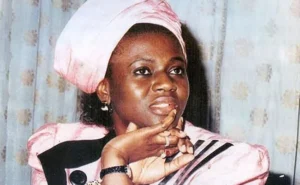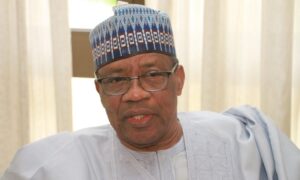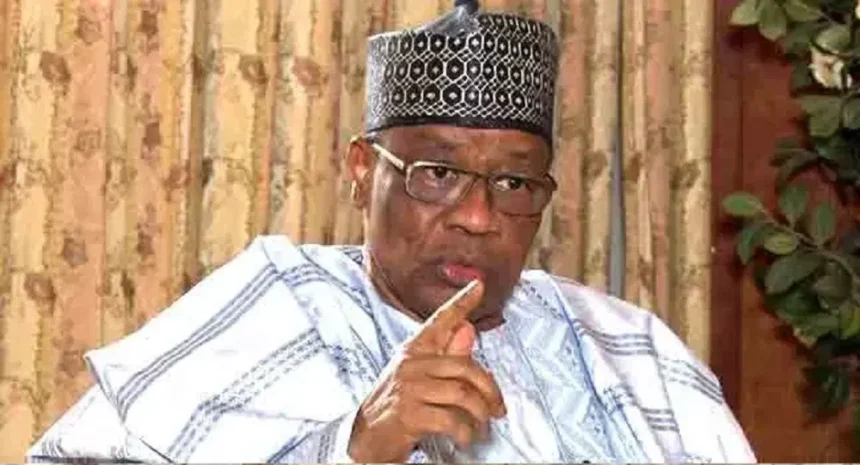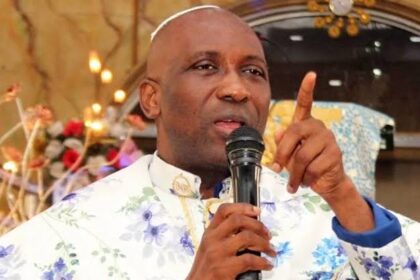Many people have always wondered why former Military President, Ibrahim Babangida has not remarried since he lost his lovely wife, Maryam 16 years ago.
Ordinarily, IBB is someone who a lot of ladies would want to date and marry. He is popular. He is influential. He is rich. He has the charm that will make any lady fall for him.
But since Maryam died, IBB has not found anyone worthy enough to replace Maryam. City People can tell you why. Its because of his emotional attachment to his ex-wife. He loved her so much.
He revealed the depth of their friendship in his autobiography. “My relationship with Maryam – born Maria, in Asaba in modernday Delta State on November 1, 1948 – preceded the Nigerian Civil War and, like much else in my life’s journey, was connected to relationships nurtured from my youth in Bida. As I said earlier, Garba Duba came from Kontagora and had been at secondary school with me in Bida, and we had become terrific friends there.”
“I was close to Duba and first met Maria while we were both still at Provincial Secondary School in Bida. Duba’s aunt, his father’s sister, Asabe, was Maria’s mother, and it was in Garba’s house that I first met Maria Okogwu (as she then was). As young officers, we shared digs in the unmarried officer’s quarters by Kanta Road in Kaduna, and I was now seeing more of Maria. She was stunning. Her ebony beauty set off enchanting eyes, and her dazzling smile showed off a lovely set of teeth; when she smiled – and she often smiled – her face lit up, and her eyes danced. Duba was as much a brother as a cousin to her, and, on the back of that, I often saw Maria at Duba’s house, and when she visited us at Kanta Road.

“Be that as it may, from the outset, I was very fond of Maria and she, eventually, of me. There was more than an element of predestination in our relationship. It was at NMTC that I began to notice Maria more. Duba’s father was fond of me, so I was mindful that my bonds with the family meant that I had to be more cautious than usual, a factor that synced with my natural shyness. She and I remained friends and maintained that friendship through my early years in the Army, which included sojourns abroad for training in India and the United Kingdom.
Her father, Leonard Nwanonye Okogwu, hailed from Asaba in modern-day Delta State and worked in the Survey department of the Northern Nigeria Ministry of Lands and Survey. His job was an itinerant one, taking him to Kaduna, Zonkwa, Kafanchan and Kontagora. During these travels, he met and married Maria’s mother, Hajiya Asabe Halima Mohammed, from Kontagora in modern-day Kaduna State. When her father returned to Asaba after retirement, she and her siblings stayed with their mother, who lived with her brother, Alhaji Muhammadu King (Duba’s father), in Unguwan Sarki, Kaduna.
Maria attended Queen Amina College and then the Federal Training Centre, both in Kaduna. During the crisis in the North, just before the Nigerian Civil War, given the dangers associated with being from the Southeast, Maria’s uncle adopted his sister’s children, and they took his surname, placing them under his protective purview. That explains why the surname on our marriage certificate was King rather than Okogwu”…
“I HAD SETTLED on Maria as the woman I would wed before being discharged from the hospital, and as soon as I was discharged, I made my way to Kaduna, where she lived with her mother and uncle. I was anxious to share the good news with her: I had decided we were destined for a life together. I admired her greatly for her reserved nature and the fact that she was well brought up. I wanted to make my intentions known to her and was determined not to accept No for an answer. Fortune favours the bold, and it smiled upon me; I counted and still count myself lucky.
Initially, Maria was highly sceptical of me as marrying material. She knew that I had a track record of being something of a man about town, and those were not the qualities she wanted in a husband. She was unconvinced of my capacity to be serious, and many people said as much to her. Her family had no objections as I was well known to them, so I had to use all the help I could muster, including Garba Duba’s father (Maria’s uncle), to solidify my proposal. He gladly lent his voice to my cause.
Once I convinced her that I was serious, the prospect of becoming Mrs Babangida was not that difficult for Maria to contemplate. I shared with her the fact that my faith was an integral and essential part of my life and that I would require her to convert to Islam. Praise be to Allah; this was not a difficult decision for Maria. Being part-Christian and part-Muslim at birth and already living in a Muslim household, it was never going to be wholly uncharted territory for her. She adapted with relative ease to married life as a Muslim.
In proposing to Maria, I assured her that, though a Muslim, I did not intend to take multiple wives and bring up children from different women. I knew full well that my chances of a stable family life would be significantly improved if I avoided Polygamy. I had witnessed close up – both among professional colleagues and in my extended family – the headaches and heartaches this led to, and that was not the life I wanted to live or to share with her. I wanted a life partner that would be by my side through thick and thin. I could not have made a better choice. She exceeded all the hopes and expectations of my youth at every stage of our life together.
After securing the promise of her hand in marriage, I returned to the war front for a short while. While there, I was promoted to a Brigade Major. Soon afterwards, I returned to Kaduna where, shortly before her 21st birthday and after my 28th, Maryam (as she had by then become preparatory to our getting married) and I got married on September 6, 1969, at the Marriage Registry in Kaduna. As she had by this time converted to Islam, the marriage registry was followed by Islamic marital rites.
From the outset, it was evident that Maryam was an excellent housewife, with a clear conception of the role of a housewife and a determination to perform that role exemplarily. Throughout our marriage, she was always very hands-on about my food. She either cooked my meals herself or personally oversaw their preparation. We both saw our marriage as our fiefdom and agreed to sort things out ourselves if we quarrelled.
We were very compatible; indeed, I can only recall two occasions on which we quarrelled, and neither of us was afraid to apologise to the other. In all our years of marriage, it was never necessary for anyone to mediate between us over a misunderstanding because of that original meeting of minds.
We also had a mutual understanding that she would always be a partner in the progress of my career. Maryam wanted to work alongside me as more than just a housewife. She recognised as I did that the ‘home front’ had to be an impregnable flank in our mutual advancement. I can state without fear of contradiction that at every stage of my career, in the Army and Government, Maryam stood four square beside me.”
“Many outside observers do not understand how a woman who knew what she wanted and went after it with a laser focus was also such a devoted wife, housewife, and mother. For me, there is no dissonance to reconcile. Her devotion to me, our family, and our country was the foundation of her success as a wife, mother, and trailblazer.
“As I write about Maryam, I cannot help but reflect on what an extraordinary person she was. I do not imagine that many could have lived in the beam of such unerring public headlights and headlines with such calm, comportment and composure. We achieved much together in a relatively short time.
As I recall our journey, I am struck by how few were the mistakes we made as a family. I was able to be the best version of myself because my wife and life partner had my back. She never gave me cause to second-guess her. I feel that our mutual trust was like a self-reinforcing superpower.
I have no doubt this is rare! Our marriage was one for the ages because we were 2 people walking as one. Maryam made the most sacrifices. However, she could still carve out a memorable and impactful niche for herself that made a difference in the lives of millions of Nigerians and our nation. No husband could be prouder of his wife than I am.
She set out to impact lives, and she did so despite the odds. Given traditional perceptions of the ‘role’ of the woman and wife in a marriage, the balance she struck between her roles as mother, wife and First Lady shifted boundaries. My family, Nigeria and I all benefited greatly from Maryam. A degree of cautious circumspection concerning one’s wife is a wise path. Still, I honestly believe that if it had been in my gift to know what lay ahead in my life before I got married, I could not have made another or a better choice than the one that topped that list at LUTH all those years ago.
The problem with a partnership in personam is that both partners rarely exit the stage simultaneously. I never imagined that Maryam would pass away before I did, but the gift of life is in Allah’s hands, not in humanity’s. It has afforded me a more extended period to recollect and reminisce, and I know in my heart that my life is bifurcated into before December 2009 and after December 2009 (when she was here & since she’s been gone).

Maryam was a very confident woman who, once determined to do something positive and beneficial with the position and role fate bestowed upon her, was very intentional in prosecuting the task before her. She was comfortable with a spectrum of people and relaxed in her skin. She also had an extensive reservoir of native intelligence.
Sometimes, I felt that 24 hours was insufficient for her in one day. She was a wife, a mother, a housewife, a passionate advocate for rural women, and most of all, a partner. She was very close to the children and knew what they were doing at every point. We decided together what was best for them and sought to shield them as best as we could from the rough and tumble of living in the public eye. We didn’t want our perceived faults and shortcomings to rub off on our children.”
“I am grateful for the life Maryam and I shared and for the fruit of our union. Coping without her has not been easy, but it has been made much less demanding by the memories of our life together and the length of her shadow.”
Now, you can imagine the big shoes his wife left behind.
– City People




